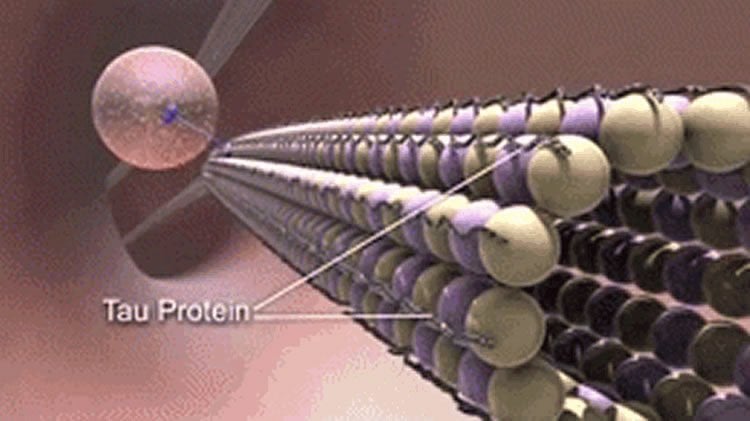Summary: A new study reports tau mutations, commonly associated with neurodegenerative diseases like dementia, may also increase the risk of developing cancers.
Source: AACR.
Mutations to the protein tau, commonly associated with neurodegenerative disorders, may serve as a novel risk factor for cancer, according to results published in Cancer Research, a journal of the American Association for Cancer Research.
“Our study revealed that the presence of tau mutations raises the risk of developing cancer,” said Fabrizio Tagliavini, MD, scientific director, IRCCS Foundation Carlo Besta Neurological Institute, Milan, Italy. “Furthermore, our bioinformatic analysis highlighted a broader functional environment for the tau protein, which had been previously associated mainly with disease development in the context of neurodegeneration.”
Tau protein is essential for the stabilization of microtubules, a major element of the eukaryotic cytoskeleton. Defective tau protein is traditionally associated with neurodegenerative disorders, such as Alzheimer’s disease and frontotemporal lobar degeneration (FTLD). “A mutated tau has a reduced ability to bind to microtubules; this leads to microtubule destabilization and cytoskeleton disruption, which is detrimental to cellular survival,” explained Tagliavini. “Additionally, free tau protein can form toxic aggregates within nerve cells, impairing neuronal function.”
Previous work in the Tagliavini lab found that mutations in tau led to chromatin defects and chromosome abnormalities. “It is well-known that chromosome aberrations are often linked to cancer,” said Tagliavini.
“Therefore, we decided to determine if there was a possible association between tau mutations and cancer.”
Tagliavini and colleagues analyzed cancer incidence in 15 families bearing seven different tau mutations and affected by FTLD. To calculate cancer risk, each tau-mutated family was matched with three reference families with superimposable pedigrees (control subject’s age, gender, and native location matching the person affected with FTLD).
Fifteen percent of subjects from tau-mutated families developed cancer, while only 9 percent of subjects from the reference families had cancer. Cancer types in both cohorts were variable; tau mutations were not associated with specific cancers. Following multivariate analysis, the researchers determined that individuals from tau-mutated families were 3.72 times more likely to develop cancer compared to the reference families.

The researchers also used a bioinformatics analysis to understand the interactions of tau protein with other proteins. They found that almost a third of proteins that tau interacts with were involved in DNA metabolism and cell cycle control; aberrant regulation of these key processes can lead to cancer, explained Tagliavini.
“Patients carrying tau mutations are usually attended for neurodegeneration,” said Tagliavini. “However, with further confirmation of our results, these patients could also be monitored for their risk of developing cancer. Clinicians should take into account both of these aspects of tau pathology.”
Limitations of the study include missing genetic analyses from several patients and individuals from reference families due to the unavailability of DNA. “The analysis of missing patient data would have allowed a more significant correlation between cancer and tau mutations, which had to be inferred with statistical analysis,” noted Tagliavini.
Funding: The authors on this manuscript were supported by the Italian Ministry of Health, the Alzheimer’s Society (United Kingdom), the Medical Research Council (MRC, UK), and the MRC Programme. Tagliavini declares no conflict of interest.
Source: Julia Gunther – AACR
Publisher: Organized by NeuroscienceNews.com.
Image Source: NeuroscienceNews.com image is in the public domain.
Original Research: Abstract for “Tau mutations serve as a novel risk factor for cancer” by Giacomina Rossi, Veronica Redaelli, Paolo Contiero, Sabrina Fabiano, Giovanna Tagliabue, Paola Perego, Luisa Benussi, Amalia Cecilia Bruni, Graziella Filippini, Mariangela Farinotti, Giorgio Giaccone, Simona Buiatiotis, Claudia Manzoni, Raffaele Ferrari and Fabrizio Tagliavini in Cancer Research. Published May 24 2018.
doi:10.1158/0008-5472.CAN-17-3175
[cbtabs][cbtab title=”MLA”]AACR “Tau Mutations May Increase Cancer Risk.” NeuroscienceNews. NeuroscienceNews, 24 May 2018.
<https://neurosciencenews.com/tau-cancer-9128/>.[/cbtab][cbtab title=”APA”]AACR (2018, May 24). Tau Mutations May Increase Cancer Risk. NeuroscienceNews. Retrieved May 24, 2018 from https://neurosciencenews.com/tau-cancer-9128/[/cbtab][cbtab title=”Chicago”]AACR “Tau Mutations May Increase Cancer Risk.” https://neurosciencenews.com/tau-cancer-9128/ (accessed May 24, 2018).[/cbtab][/cbtabs]
Abstract
Tau mutations serve as a novel risk factor for cancer
In addition to its well-recognized role in neurodegeneration, tau participates in maintenance of genome stability and chromosome integrity. In particular, peripheral cells from patients affected by frontotemporal lobar degeneration carrying a mutation in tau gene (genetic tauopathies), as well as cells from animal models, show chromosome numerical and structural aberrations, chromatin anomalies, and a propensity toward abnormal recombination. As genome instability is tightly linked to cancer development, we hypothesized that mutated tau may be a susceptibility factor for cancer. Here we conducted a retrospective cohort study comparing cancer incidence in families affected by genetic tauopathies to control families. Additionally, we carried out a bioinformatics analysis to highlight pathways associated with the tau protein interactome. We report that the risk of developing cancer is significantly higher in families affected by genetic tauopathies, and a high proportion of tau protein interactors are involved in cellular processes particularly relevant to cancer. These findings disclose a novel role of tau as a risk factor for cancer, providing new insights in the various pathological roles of mutated tau.






